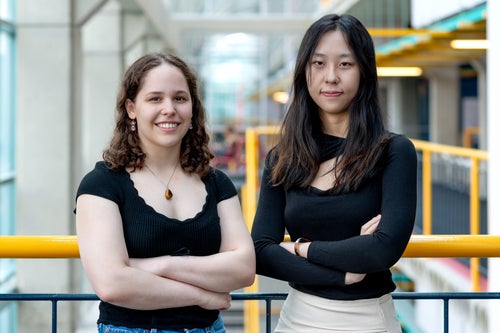Congratulations to Leyi Yan and Hadas Barabash, the winners of the 2025 Jessie W.H. Zou Memorial Award for Excellence in Undergraduate Research. The awards ($1000 each) are given each year to undergraduate students in their last year of study for outstanding research activities.

Hadas Barabash (left) and Leyi Yan (right)
Leyi Yan
Leyi Yan is a fourth-year Computer Science and Statistics student. She received the award in recognition of her paper “EnsembleCI: Ensemble earning for Carbon Intensity Forecasting,” which is accepted to ACM E-Energy 2025. “Receiving this award is a meaningful honor that inspires me to continue exploring research in sustainability – where classroom knowledge meets real-world impact,” she says.
Yan’s research introduces an “adaptive ensemble learning model that improves carbon intensity (CI forecasting by dynamically integrating region-specific models.” Rather than using a one-size-fits all approach, the model accounts for a mix of energy sources such as solar, wind, and fossil fuels, leading to more reliable long-term predictions. “By enabling industries to align energy-intensive operations with low-carbon periods, this framework supports actionable strategies to reduce emissions, bridging technical innovations with real-world decarbonization goals,” she explains.
“Leyi Yan is one of the most promising undergraduate researchers I have supervised,” says Sihang Liu, an assistant professor in the School of Computer Science. “I am confident that she will continue to do outstanding research in the future.”
“I am deeply grateful to Professor Sihang Liu and Professor Yi Ding for their expert guidance, invaluable feedback, and the opportunity to dive into computational sustainability, igniting my passion for this field,” Yan says. “Also, I want to thank my family and friends for their unwavering support throughout this journey. Their encouragement has been my foundation and this achievement is a shared celebration of collective effort.”
Hadas Barabash
Hadas Barabash is a fifth-year computer science with a minor in combinatorics and optimization.
“I feel very honoured to win this award, and grateful for the wonderful team that I had a chance to work with,” she says. “Math research can be intimidating, but I was fortunate to collaborate with insightful and kind people that made my experience truly rewarding. I would like to encourage undergraduate students to get involved in research if they are interested in it. I felt intimidated by the idea of it for a long time, but I ended up greatly enjoying our work and learning a lot.”
Barabash did research with Joseph Cheriyan, professor of Combinatorics and Optimization, on the NP-complete minimum multicut problem. They worked on finding tight approximation algorithms and integrality ratios for special classes of graphs, including cactus graphs. “For this, we largely worked on extending ideas from a known 2-approximation algorithm for trees,” she explains. “Toward finding a lower bound on the integrality ratio, we also implemented a computational method that finds the maximum integrality ratio over all cost functions for a specific instance.”
“Hadas’s enthusiasm, powers of study and assimilation, writing skills, and work ethic are exceptional, and surpassed my highest expectations,” says Joseph Cheriyan, professor of Combinatorics and Optimization. She “has the potential to become a leader in [her] chosen field.”
Barabash is grateful to Cheriyan for his “invaluable guidance throughout our research and in preparing for graduate studies,” as well as project team members Nikhil Kumar, Sina Kalantarzadeh, and Tom Iagovet. “I’m very grateful to my family and friends for their support and encouragement throughout my undergrad,” she adds. “Lastly, I want to thank my grandfather, Aizik Mishkis, for fostering my love of mathematics from a young age.”
To learn more about the Jessie W.H. Zou Memorial Award for Excellence in Undergraduate Research, visit the Math website.